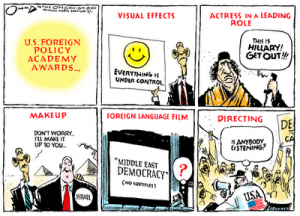Is There More to Libya than Removal of Gadhafi?
 Just last week, the U.S., Britain and France renewed their pledge to keep military pressure on Moammar Gadhafi with the war in Libya. What started out as a humanitarian mission has clearly turned into “regime change.” An Associated Press story reported last week, “In a joint declaration, President Barack Obama, British Prime Minister David Cameron and French President Nicolas Sarkozy say they will not stop the campaign and will ‘remain united.’ . . . ‘It is not to remove Gadhafi by force,’ they wrote. . . . The carefully worded declaration denounces Gadhafi and says: ‘It is impossible to imagine a future for Libya with Gadhafi in power.” (Click here to read the complete AP story.) So, NATO says it won’t use force, but they want him gone no matter what? Gadhafi has been a bad guy for a long time, so why the big push to get rid of him now?
Just last week, the U.S., Britain and France renewed their pledge to keep military pressure on Moammar Gadhafi with the war in Libya. What started out as a humanitarian mission has clearly turned into “regime change.” An Associated Press story reported last week, “In a joint declaration, President Barack Obama, British Prime Minister David Cameron and French President Nicolas Sarkozy say they will not stop the campaign and will ‘remain united.’ . . . ‘It is not to remove Gadhafi by force,’ they wrote. . . . The carefully worded declaration denounces Gadhafi and says: ‘It is impossible to imagine a future for Libya with Gadhafi in power.” (Click here to read the complete AP story.) So, NATO says it won’t use force, but they want him gone no matter what? Gadhafi has been a bad guy for a long time, so why the big push to get rid of him now?
According to a recent article by Ellen Brown (creator of Webofdebt.com), there is a lot more to the story than you are getting from the mainstream media. She has put together a well-researched piece that pulls down the veil of the Libyan war. You may think Libya is all about oil, but it is also about the U.S. dollar, water and banking! Please enjoy this intriguing post. –Greg Hunter—
——————————————————————————–
Libya: All About Oil, or All About Banking?
By Ellen Brown Guest Writer for USAWatchdog.com
Several writers have noted the odd fact that the Libyan rebels took time out from their rebellion in March to create their own central bank – this before they even had a government. Robert Wenzel wrote in the Economic Policy Journal:I have never before heard of a central bank being created in just a matter of weeks out of a popular uprising. This suggests we have a bit more than a rag tag bunch of rebels running around and that there are some pretty sophisticated influences.
Alex Newman wrote in the New American: In a statement released last week, the rebels reported on the results of a meeting held on March 19. Among other things, the supposed rag-tag revolutionaries announced the “[d]esignation of the Central Bank of Benghazi as a monetary authority competent in monetary policies in Libya and appointment of a Governor to the Central Bank of Libya, with a temporary headquarters in Benghazi.”
Newman quoted CNBC senior editor John Carney, who asked, “Is this the first time a revolutionary group has created a central bank while it is still in the midst of fighting the entrenched political power? It certainly seems to indicate how extraordinarily powerful central bankers have become in our era.”
Another anomaly involves the official justification for taking up arms against Libya. Supposedly it’s about human rights violations, but the evidence is contradictory. According to an article on the Fox News website on February 28: As the United Nations works feverishly to condemn Libyan leader Muammar al-Qaddafi for cracking down on protesters, the body’s Human Rights Council is poised to adopt a report chock-full of praise for Libya’s human rights record.
The review commends Libya for improving educational opportunities, for making human rights a “priority” and for bettering its “constitutional” framework. Several countries, including Iran, Venezuela, North Korea, and Saudi Arabia but also Canada, give Libya positive marks for the legal protections afforded to its citizens — who are now revolting against the regime and facing bloody reprisal.
Whatever might be said of Gaddafi’s personal crimes, the Libyan people seem to be thriving. A delegation of medical professionals from Russia, Ukraine and Belarus wrote in an appeal to Russian President Medvedev and Prime Minister Putin that after becoming acquainted with Libyan life, it was their view that in few nations did people live in such comfort:
[Libyans] are entitled to free treatment, and their hospitals provide the best in the world of medical equipment. Education in Libya is free, capable young people have the opportunity to study abroad at government expense. When marrying, young couples receive 60,000 Libyan dinars (about 50,000 U.S. dollars) of financial assistance. Non-interest state loans, and as practice shows, undated. Due to government subsidies the price of cars is much lower than in Europe, and they are affordable for every family. Gasoline and bread cost a penny, no taxes for those who are engaged in agriculture. The Libyan people are quiet and peaceful, are not inclined to drink, and are very religious.
They maintained that the international community had been misinformed about the struggle against the regime. “Tell us,” they said, “who would not like such a regime?”
Even if that is just propaganda, there is no denying at least one very popular achievement of the Libyan government: it brought water to the desert by building the largest and most expensive irrigation project in history, the $33 billion GMMR (Great Man-Made River) project. Even more than oil, water is crucial to life in Libya. The GMMR provides 70 percent of the population with water for drinking and irrigation, pumping it from Libya’s vast underground Nubian Sandstone Aquifer System in the south to populated coastal areas 4,000 kilometers to the north. The Libyan government has done at least some things right.
Another explanation for the assault on Libya is that it is “all about oil,” but that theory too is problematic. As noted in the National Journal, the country produces only about 2 percent of the world’s oil. Saudi Arabia alone has enough spare capacity to make up for any lost production if Libyan oil were to disappear from the market. And if it’s all about oil, why the rush to set up a new central bank?
Another provocative bit of data circulating on the Net is a 2007 “Democracy Now” interview of U.S. General Wesley Clark (Ret.). In it he says that about 10 days after September 11, 2001, he was told by a general that the decision had been made to go to war with Iraq. Clark was surprised and asked why. “I don’t know!” was the response. “I guess they don’t know what else to do!” Later, the same general said they planned to take out seven countries in five years: Iraq, Syria, Lebanon, Libya, Somalia, Sudan, and Iran.
What do these seven countries have in common? In the context of banking, one that sticks out is that none of them is listed among the 56 member banks of the Bank for International Settlements (BIS). That evidently puts them outside the long regulatory arm of the central bankers’ central bank in Switzerland.
The most renegade of the lot could be Libya and Iraq, the two that have actually been attacked. Kenneth Schortgen Jr., writing on Examiner.com, noted that “[s]ix months before the US moved into Iraq to take down Saddam Hussein, the oil nation had made the move to accept Euros instead of dollars for oil, and this became a threat to the global dominance of the dollar as the reserve currency, and its dominion as the petrodollar.”
According to a Russian article titled “Bombing of Lybia – Punishment for Ghaddafi for His Attempt to Refuse US Dollar,” Gadaffi made a similarly bold move: he initiated a movement to refuse the dollar and the euro, and called on Arab and African nations to use a new currency instead, the gold dinar. Gadaffi suggested establishing a united African continent, with its 200 million people using this single currency. During the past year, the idea was approved by many Arab countries and most African countries. The only opponents were the Republic of South Africa and the head of the League of Arab States. The initiative was viewed negatively by the USA and the European Union, with French president Nicolas Sarkozy calling Libya a threat to the financial security of mankind; but Gaddafi was not swayed and continued his push for the creation of a united Africa.
And that brings us back to the puzzle of the Libyan central bank. In an article posted on the Market Oracle, Eric Encina observed: One seldom mentioned fact by western politicians and media pundits: the Central Bank of Libya is 100% State Owned. . . . Currently, the Libyan government creates its own money, the Libyan Dinar, through the facilities of its own central bank. Few can argue that Libya is a sovereign nation with its own great resources, able to sustain its own economic destiny. One major problem for globalist banking cartels is that in order to do business with Libya, they must go through the Libyan Central Bank and its national currency, a place where they have absolutely zero dominion or power-broking ability. Hence, taking down the Central Bank of Libya (CBL) may not appear in the speeches of Obama, Cameron and Sarkozy but this is certainly at the top of the globalist agenda for absorbing Libya into its hive of compliant nations.
Libya not only has oil. According to the IMF, its central bank has nearly 144 tons of gold in its vaults. With that sort of asset base, who needs the BIS, the IMF and their rules?
All of which prompts a closer look at the BIS rules and their effect on local economies. An article on the BIS website states that central banks in the Central Bank Governance Network are supposed to have as their single or primary objective “to preserve price stability.” They are to be kept independent from government to make sure that political considerations don’t interfere with this mandate. “Price stability” means maintaining a stable money supply, even if that means burdening the people with heavy foreign debts. Central banks are discouraged from increasing the money supply by printing money and using it for the benefit of the state, either directly or as loans.
In a 2002 article in Asia Times titled “The BIS vs National Banks,” Henry Liu maintained:
BIS regulations serve only the single purpose of strengthening the international private banking system, even at the peril of national economies. The BIS does to national banking systems what the IMF has done to national monetary regimes. National economies under financial globalization no longer serve national interests.
. . . FDI [foreign direct investment] denominated in foreign currencies, mostly dollars, has condemned many national economies into unbalanced development toward export, merely to make dollar-denominated interest payments to FDI, with little net benefit to the domestic economies. He added, “Applying the State Theory of Money, any government can fund with its own currency all its domestic developmental needs to maintain full employment without inflation.” The “state theory of money” refers to money created by governments rather than private banks.
The presumption of the rule against borrowing from the government’s own central bank is that this will be inflationary, while borrowing existing money from foreign banks or the IMF will not. But all banks actually create the money they lend on their books, whether publicly-owned or privately-owned. Most new money today comes from bank loans. Borrowing it from the government’s own central bank has the advantage that the loan is effectively interest-free. Eliminating interest has been shown to reduce the cost of public projects by an average of 50%.
And that appears to be how the Libyan system works. According to Wikipedia, the functions of the Central Bank of Libya include “issuing and regulating banknotes and coins in Libya” and “managing and issuing all state loans.” Libya’s wholly state-owned bank can and does issue the national currency and lend it for state purposes.
That would explain where Libya gets the money to provide free education and medical care, and to issue each young couple $50,000 in interest-free state loans. It would also explain where the country found the $33 billion to build the Great Man-Made River project. Libyans are worried that NATO-led air strikes are coming perilously close to this pipeline, threatening another humanitarian disaster.
So is this new war all about oil or all about banking? Maybe both – and water as well. With energy, water, and ample credit to develop the infrastructure to access them, a nation can be free of the grip of foreign creditors. And that may be the real threat of Libya: it could show the world what is possible. Most countries don’t have oil, but new technologies are being developed that could make non-oil-producing nations energy-independent, particularly if infrastructure costs are halved by borrowing from the nation’s own publicly-owned bank. Energy independence would free governments from the web of the international bankers, and of the need to shift production from domestic to foreign markets to service the loans.
If the Gaddafi government goes down, it will be interesting to watch whether the new central bank joins the BIS, whether the nationalized oil industry gets sold off to investors, and whether education and health care continue to be free.
———————————————————————-
Ellen Brown is an attorney and president of the Public Banking Institute, http://PublicBankingInstitute.org. In Web of Debt, her latest of eleven books, she shows how a private cartel has usurped the power to create money from the people themselves, and how we the people can get it back. Her websites are http://webofdebt.com and http://ellenbrown.com.













This article makes it perfectly clear what our military is fighting for, bankers, big oil and for globalization. Sad but true. The last paragraph says it all. The new bank will join the BIS, the oil will be privatised and the people of Lybia will now be forced to pay for everything they do as all municipalities will also be privatized. I do not believe in socialism but if a country with natural resourses like Libya can sell it’s oil and they can run their own curreny properly, then all of its citizens should reap the benefits of this. Central banking with fiat currency is the single most destructive force in the world today bar none. If a government could responsibly run a fiat currency with low or no interest it would be ideal but I still do not trust anyone person or small group to do this without eventually somehow taking advantage of this power, so I do believe in hard money. Amazingly enough, it seems that is what Gadhafi was actually trying to acomplish, gold backed money for Africa. It is looking pretty obvious as to why we have a rebellion in Lybia, God forbid a country doesn’t fall into line with the rulers of the world, the globalist central bankers.
greg, outstanding expose. here we go again. send in the cia to rouse the rabble and foment a revolution in order to pave the way for a bankster takeover.
things i did not know about libya. seems the usa could take a few pointers.
the really sad thing is our go along to get along military. sorry, but supporting the troops is no longer a viable option.
G. Johnson,
Ellen Brown did a great job of researching this article. I especially loved it.
Greg
Thank you for getting this info out. I knew there had to be an economic catalyst for either bankers or the MIC behind this invasion.
Obama is exposed as the tool he is for central bankers.
Sadly, most Americans have no clue how powerful this group is. Remember the words of Mayer Amschel Rothschild “Give me control of a nation’s money and I care not who makes her laws.”
Anyone care to posit why mainstream press does not report this? Careful, though, you may get the Anti defamation league after you.
Gosh darn Hoppe!! You wouldn’t expect a highly dignified prez of the U.S. to be associated with any small banks. So let’s just close the small ones down. (Anyways, the big ones give the most campaign money).
I have to say that this article is one of the best I’ve read. I made a hard copy of it to reread and look forward to buying E. Browns book… Thanks so much Greg.
boiled down …the West is trying to stop China from owning so many resources ….. trade war turns into a shooting war ….
“If the Gaddafi government goes down, it will be interesting to watch whether the new central bank joins the BIS, whether the nationalized oil industry gets sold off to investors, and whether education and health care continue to be free.”
Answers: yes, yes, and doubtful.
Thanks for posting Ellen Brown. I credit Web of Debt as the first book leading to my state of “awakenment”. If fellow watchdoggers have not read the book, it’s well worth the read.
Thanks Greg.
Kevin,
Thank you for the comment I am sure Ellen Brown will appreciate the positive feedback.
Greg
Need to read this again and do some research. No one really wants the U$S. Even Russia is pushing gold based standard. But we do seem to be rushing headlong toward a “one” world government where the the kindly government takes care of all of us
Wow, what an eye opener, I had no idea but should have known the banksters were behind the Lybia matter. Our poor military is no more now that a poor little beaten down puppy with its tail between its legs doing whatever the liberal government and media wants it to. The military was against this invasion and should have stated it so or at least not gone of national television (shows like meet the press) and tried to tell the american people the mission is clear, a cake walk in the park, over in a matter of a few short weeks, and other crap like that; the military’s creditability is shot (no pun intended).
Secondly, maybe its time to have our central bank dismantled. The reason the central bank was placed in the first instance by our government was to stop the boom bust cycles of the economy. It never accomplished that, there have been four or five recessions since I was young; every 10 years or so, and, of course, we are in recession now once again and trying to recover; just another cycle. Frankly, there is no need for the Federal Reserve, its function is not necessary to have an economy, jobs, homes, a life, etc. but somehow the elite, the bankers, have convinced the government and the media that life would go back to the stone age without it.
Lastly, boom bust cycles are corresponding to our little wars. We just can’t stop getting into them. Think about it, we are engaged in a war or “police action” about ever ten years or so too. Korea, Vietnam, Gulf 1, Gulf 2, Lybia, not to mention a few small ones such as Panama, Grenda, Lebanan, etc during the last 50 years or so. We just can’t seem to stop shooting for one reason or another. Maybe its time to we came home and took care of our own citizens who are starving here, homeless, out of work, underemployed or out of work entirely, foreclosed upon and evicted from their homes, lost their small business, etc. – wouldn’t that be a novel idea?
The evil elite with their layered lies piled high just can’t hide the truth from us for too long.
It’s no surprise why ObamaNation is working on a Chinese style control of the internet.
Something else I heard was that Libya was moving to sell their oil to China instead of the European Countries ?
That would also helps explain why France and UK are so determined to now send in ground troops ,but then NATO is out of missiles and without enough planes after only a couple week.
And then we have #1 ‘The Donald’ calling for seizure of Libya’s Oil wells and taking Iraq’s oil.
Keystone Cops running things ?
The Saudi’s don’t like Obama (inaction with nuclear Iran) or the way he and the evil elite pushed Mubarak out and cutting back on oil production might be their way of getting even ?
Should be a very interesting summer especially with ‘infidel’ Israel in the middle of all this.
One thing I see that they fail to mention is that Libya has a huge supply of physical gold & silver, not just oil. It seems that the major banks would be willing to use our military to get this supply for them, since they have shorted the metals for at least 25 years.
It also goes alone with what Gen. Smedley Butler said, that the military is at the beck & call of the corporations.
John
John,
Good point!
Greg
Greg I am curious as to your beliefs about the power elite and globalism. Do you believe that all that is happening now and say for the past 15-20 years or even 30-40, is merely coincidence or do you believe that there is more to it and that these wars and bubbles are happening on purpose in order to usher in a new global fiat currency through the BIS or World Bank? The Euro and US Dollar are going down in flames and even though they play off eachother sometimes, relative to gold they are crashing fast. All paper money is. All the BRICS are screaming for a new currency so they do not need to deal with devaluation anymore. Maybe they will be happy just to have some paper that devalues equally for all countrys it seems at this point. Who is going to buy US debt when QE2 stops? There will have to be a QE3 and 4 because no one is stupid enough to buy a treasury bond even at 5-6% right now, real inflation is at 9-10% and will get worse. There is no economic recovery and homes will fall further. Do you think the Fed is trapped into this corner? From what I have been reading it seems to make a lot of sense. China raised rates a little and EUCB just jacked up by .25% but there are more bailouts needed there than they have money and now Finland is going to deny bailouts totally. This is absolutely crazy. I really do think it is being done on purpose to force countrys to give up soveriegnty and sell hard assets for paper debt. Greece is selling ports and islands to pay for their socialist ways, but after their bailout, they brought down their deficits and lowered their debt/GDP% and were still downgraded by S&P as a big risk. Soros and GS are over there divying up the country. Will central bankers create enough money and debt to buy the whole world? I do not think it possible but Iceland is the only country saying screw you to the paper printers of debt and austerity. Sad days we are in my friend. Do you think it is being done on purpose or merely coincidental? It seems like it is a 50/50 ratio among the people I read that it is a conspiracy or just business as usual. Curious as to your opinion sir. Thanks James
James M,
I have a friend of mine who thinks this is all being done on purpose. I am not sure if it is planned or a giant mistake, but one way or another, we are heading for a currency collapse. That I am sure of, and yes sad days are ahead of us indeed. Thank you for the comment and analysis.
Greg
Thank you for your response. I am a constant reader of many websites and I must agree a currency collapse is inevitable at this point. There is no way out. The powers that be have painted themselves into a corner at our expense. It will be quite interesting to see the next moves they conjure up to keep the game in play. I do believe it being done with purpose and malice.
Thank you James. I agree that a collapse is inevitable, and yes, it might be on purpose.
Greg
that Ellen makes it easy for a country boy to understand.
People indicted for online poker (a victimless crime): 11
People indicted on Wall Street for financial collapse, robbing millions of equity, jobs and savings accounts: 0
Enough said.
Stephen,
I love this!!! Thank you.
Greg
“To protect civilians” is the new phrase coined in place of “to prevent communism” from the 70’s.
The latter resulted in the deaths of hundreds of thousands of people in south america, killed by dictatorships implemented and supported by the U.S. government.
Sorry, but that´s the true.
Thank you for this post.
I have been searching for a sensible analysis of the Libyan situation since the start of the assault.
The set of circumstances surrounding this invasion are exactly as Naomi Klein outlines in her book, The Shock Doctrine.
Unrest in Tunisia and Egypt created the perfect opportunity to take out Gadhafi and force the will of the banksters on the soon, newly minted government of Libya.
History repeats itself once again.
Haddanuff,
Thank you for the feedback and comment!
Greg
This article along with the excellent “The New Cold War,” (in Libya,) by Patrick Henningsen, on your website certainly explains a scenario we’ll never hear about in msm. Henningsen explains this is a War of Natural Resources with strong Chinese interests and postulates the US and China are creating a new Cold War for the rich natural resources of Africa. I’m greatly simplifying. I suggest people read Henningsen’s article. Thank you, Greg for such enlightening information.
Thank you KC! You haven’t commented for awhile and I am happy you are back!
Greg
Greg–great stuff, here! But isn’t it in China’s best interest (no pun intended) to preclude this house of cards from collapsing?
Ken,
At some point this whole thing crashes whether China wants it to or not. This will be a huge event and nothing will be the same after it hits full force. Thanks for the comment.
Greg
great article. I hope a lot of people will read it so they will realize the truth. I oo bad our government doesn’t take care of its people like Gaddafi does for Libyians.i always wondered why the US didn’t get out of the United Nations. Now i know why they can’t.